Dubai aims to become the world's best city to live in by 2040, with the 'Dubai 2040 Urban Master Plan' paving the way for sustainable urban development. Aligned with the UAE's vision for the next 50 years, the plan prioritises enhancing happiness and quality of life, and the proposed Dubai Mangroves project aligns closely with the goals outlined in the ambitious Dubai 2040 Master Plan. Spearheaded by URB, the same team behind innovative projects like Dubai Reefs and The Loop, this initiative represents an exceptional effort to merge ecological preservation with urban development.
Covering 72 kilometres of coastline, the project aims to plant over 100,000 mangrove trees, marking a significant step towards sustainable environmental practices within the city.
Once approved, the Dubai Mangroves project is set to become the world’s largest coastal regeneration initiative, solidifying Dubai’s position as one of the most resilient cities by 2040. Its ambitious scale and forward-looking vision mark a substantial leap towards sustainable urban development, seamlessly combining the restoration of crucial mangrove ecosystems with the enrichment of urban landscapes.
Why Is This Project Important
- Mangroves lie at the heart of the initiative, renowned for their unique capacity to sequester carbon (the process of capturing and storing atmospheric carbon dioxide), protect coastlines, and sustain marine ecosystems.
- Each mangrove tree can absorb approximately 12.3kg of carbon dioxide (CO2) annually, contributing to a total carbon sequestration of 1.23 million tonnes per year for the entire project.
- This sequestration volume equals removing the CO2 emissions of over 260,000 gasoline-powered passenger vehicles annually.
- The project emphasises the vital role of mangroves in preserving coastal environments, highlighting their effectiveness in carbon storage, biodiversity maintenance, and defence against climate change impacts like erosion and rising sea levels.
Dubai's investment in mangroves underscores its commitment to innovative and sustainable solutions for global environmental challenges, establishing the city as a leader in coastal and urban ecosystem preservation.
Updates So Far
The project is currently in its research phase, planning pilot studies across six zones including Jebel Ali Beach, Dubai Marina Beach, Jumeirah Public Beach, Umm Suqeim Beach, Mercato Beach and Dubai Islands Beach.

Additionally, The project will incorporate several educational and entertaining features, like the Mangrove Visitor Hub, aimed at informing and involving both the local community and visitors in understanding the significance of mangroves and broader environmental issues. Alongside the Botanical Museum and Nature Reserve Conservation Center, these facilities will function as hubs for research, learning, and advocacy, encouraging environmental awareness and responsibility among residents and tourists.